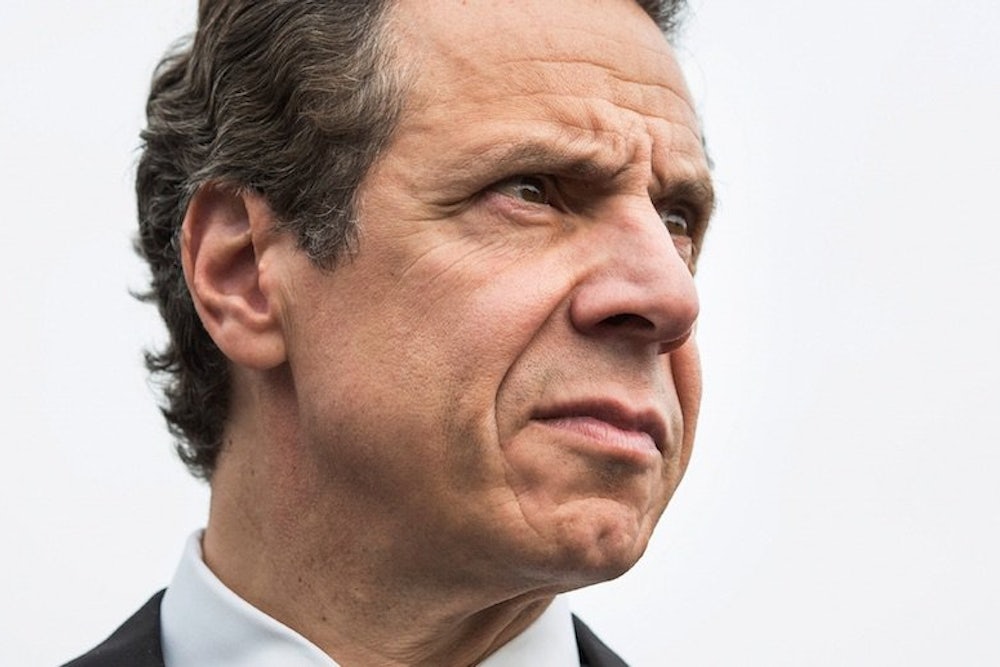The fight for financial reform has shifted to an unlikely setting: Albany. New York Governor Andrew Cuomo must soon appoint a replacement superintendent for the state Department of Financial Services (DFS), an obscure regulatory position that the current head, Benjamin Lawsky, elevated into a major national player over the past four years.
Unfortunately, most of the names floated for the job—with one key exception—seem to herald a step backward from Lawsky’s aggressive approach. They include a defender of the student loan industry, a prosecutor reluctant to prosecute, and a former executive at mega-bank JPMorgan Chase.
The position wasn’t originally intended to serve as such a battleground. Cuomo created DFS by merging state banking and insurance regulators into one agency—a transparent attempt to outflank a political rival, Attorney General Eric Schneiderman. The idea was to transfer power into the executive branch and collect funds from penalties on the financial industry, which have risen to $6 billion since 2011.
But as I wrote in a profile for The New Republic last April, Lawsky, Cuomo’s former chief of staff, transformed the state office into something more, even leading federal regulators to toughen their responses. By threatening to revoke licenses and kick banks out of the world’s financial center, he could secure bigger fines and punishment. He is arguably solely responsible for the demise of Ocwen, the non-bank mortgage servicer engaged in repeated predatory activity toward homeowners. He banned French bank BNP Paribas from processing dollar-clearing services as part of a money laundering case.
And despite having no prosecutorial powers, Lawsky focused on individual accountability as well, a rare perspective among regulators. He has removed dozens of financial executives from the industry, most recently Barclays Bank employees for manipulating foreign exchange transactions.
Beyond crackdowns on Wall Street, advocacy groups in New York praised Lawsky for protecting vulnerable communities. He worked to prevent payday lending, illegal debt collection, and insurance scams. “He’s served the public interest, not the corporate interests that dominate politics,” said Sarah Ludwig of the New Economy Project, an economic justice group in New York City. “I don’t normally speak in such a complimentary fashion about these people.”
Lawsky announced he would depart in June to open a law firm and teach at Stanford University. The New York Times reported a preliminary list of names under consideration to replace him. It’s mostly a depressing lot.
Jonathan Schwartz was managing director and general counsel for JPMorgan Chase; before that he toiled for almost-as-unpopular cable monopolists Cablevision and Time Warner. Bridget Healy is the lead lawyer for the Dutch financial institution ING. Under her watch, the company paid $15 million to settle charges that their life insurance and annuity unit received kickbacks from mutual funds that sold their products. ING also paid $5.75 million to the Department of Labor over processing errors in its own company 401(k) plan.
Both Hector Gonzalez and Michele Hirshman, other names on the list, left federal prosecutor positions to join corporate law firms, where they now defend clients they would have previously investigated. Gonzalez “represented a leading education and finance company” in investigations of the student loan industry, and advised the American Securitization Forum, a leading trade group for Wall Street investment banks that package loans into securities. Hirshman regularly advises “pharmaceutical manufacturers, financial institutions … and public and private company executives,” and has said that “practices that need reform should be a focus for regulators, but criminal charges are not the right vehicle to obtain systemic change.”
The common thread of comfort with banking elites signals that the next superintendent won’t ruffle the same feathers as Lawsky, if his successor is drawn from that crowd.
But Inside Mortgage Finance, a trade publication, threw out another possibility: Rohit Chopra, currently the student loan ombudsman for the Consumer Financial Protection Bureau.
Chopra was hired by Elizabeth Warren when she was standing up the agency. He has been outspoken about the abuses of the lending industry, particularly private banks, which have complained about his assertive style. But they have also begrudgingly lowered interest rates on student loans and offered more loan modifications to struggling borrowers. With Chopra’s involvement, CFPB has set rules on student loan servicers and penalized student loan debt relief companies.
This gives Cuomo a choice: Replace Lawsky by taking another spin of the revolving door between regulatory agencies and Wall Street, or go with Chopra, someone who represents the newer breed of aggressive leadership on holding financial institutions accountable. “It’s an incredibly critical appointment,” said Kirsten Keefe, consumer lawyer at the Empire Justice Center, a legal services organization. “Anyone who the governor brings in should have demonstrated experience in taking on the financial sector.”
The decision also comes at a propitious time for Cuomo. While he appears to hold out hope for a third term, his approval ratings have sunk to an all-time low of 41 percent, according to the Siena Research Institute. Corruption scandals have swirled around Albany, taking down both leaders of the state House and Senate, and threatening Cuomo himself. New York City Mayor Bill de Blasio, among several potential challengers to Cuomo in 2018, blasted the governor over the weekend for not doing enough for the city’s residents.
Cuomo has recently tried to play up a more liberal image, after receiving a significant primary challenge from Zephyr Teachout last year. Last month, he directed a state wage board to consider raises to the minimum wage in the fast food industry, going around the legislature. With de Blasio courting national progressives with a “Contract with America,” Cuomo has clearly felt the pressure, giving the DFS selection even more weight.
The network of community, labor and civil rights groups in New York are paying attention to the DFS choice, and given Lawsky’s stature nationally as a financial reformer, the attention could spread. Another strong leader at DFS will establish that office as one of the nation’s most important positions for reforming Wall Street. A milquetoast replacement will let industry executives breathe easier.
